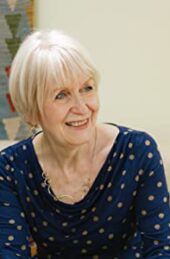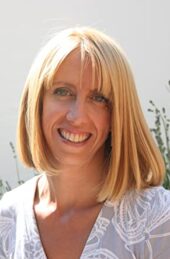Chrystyna Lucyk-Berger, you grew up in Minneapolis, Minnesota in a Ukrainian community that you’ve stated had many factions within. Do you know how those factions would view the Russian invasion?
I don’t know a single Ukrainian in America, or Ukrainian-American, who views the invasion as a glorious effort to bring Ukraine back into the Russian fold. We’re united on this front. My grandmother passed away in January. I’m relieved she did not have to witness this. Her story, by the way, is the third one in the collection. She would have been 99 this summer.
Where in Ukraine does your family come from, and how much awareness of history is there among them?
My grandparents came from L’viv (western Ukraine) and Luts’k (northwest of Kyiv), and our awareness was very acute growing up. We attended Ukrainian church, participated in Ukrainian Saturday school, Ukrainian scouts, Ukrainian folk dance, and spoke Ukrainian at home. I would venture to say my nieces and nephews might have a more diluted version than my brother and I grew up with. It’s another reason I wrote; to recover and preserve our history. It is also my tribute to the millions of displaced and oppressed peoples from all around the world; my experiences has made me acutely empathetic to their struggles.
What are their thoughts on Souvenirs From Kyiv?
My grandmother read the first edition and said it was hard to relive her memories but was thrilled that it was garnering attention and awards. Uncle Pete is the last survivor of these stories. Last year, we had a few Skype session while I was writing The Woman at the Gates (his character, Kulka, appears in that novel, too) and he was the one who put me onto my next project. He said, “If you want to write stories about the war, examine what happened right after it. Now those were some interesting experiences.” He’s right.
Putin has invoked a version of history as one of the motivations behind his invasion – how much do you think his view is shared by his fellow countrymen?
If I have learned anything about writing historical fiction, it’s this: all history is made up of fact and fiction. Stories are nothing more than selective memory and versions of the events we perceived. I believe we process especially dramatic events like this in order to protect ourselves. Then there are those who tell stories to manipulate—as we have seen time and again, most especially in the political arena.
Putin’s version is not a new version. It’s an old version. It’s the same version the Russians have been singing for thousands of years. The tune has changed but the lyrics are the same. “Ukraine belongs to us.” How much do I think his view is shared by his fellow countrymen? I can’t even pretend to guess, but here’s a fact: nobody in the world is immune to propaganda.
Has the reaction of Ukrainians, particularly those in the east, surprised you in any way?
I grew up in the United States, where apple pie, hot dogs and freedom practically come in the same box at the supermarket. I cannot pretend to understand what the people in eastern Ukraine are going through. I can only tell you that I weep. Every night. This deep-seated need to see Ukraine victorious is written into my DNA. So, the question is relevant: Is my view skewed? It’s plausible, right?
True story, just today: I live in Austria. I know a Russian woman quite well, and she met a stranger in our town. She informed me that this man is originally from Kharkiv (in eastern Ukraine) and he told her his story. He told her that Russia did not invade. Ukraine and the United States started the war. Ukrainians are killing their own citizens and that’s why Russia invaded. And then she said to me, “I am so relieved he told me the truth! I was feeling awful about my country just killing people for no good reason.” She had really reached the point where she had to choose a version, and mark it as truth just so that she can feel better about herself; sleep better at night.
I kept my mouth shut. I left her at the train station and went to visit the Ukrainian refugees we’re helping here. The Ukrainians who are fleeing Russians, mind you. Not the other way around.
You’ve written about other parts of Europe in the Second World War, but with the invasion of Ukraine by Russia, do you think you’ll remain in that area for your future stories?
Currently, I’m working on a series that begins and ends in Vienna, inspired by actual events but also by an exciting discovery. My journeys take me to the stories and the stories take me on the journeys. The locations—South Tyrol, Czechoslovakia, Austria, Ukraine—just happen to be the settings in which the events took place. The minute I smell a hint of injustice to any group of underdogs, I’m on it, investigating it. So, yes, I’m obsessed by all reports coming out of Ukraine right now.
Ukraine suffered terribly during the Second World War. To what extent do you think that history remains with Ukrainians today, as they fight off the Russian invasion?
It was some 80 years ago but those scars are still deep. There is nothing like invaders demolishing your city, killing your people, inflaming your anger, that will help disarm the differences and stitch communities together. Ukraine will persevere. Her people? They will be scarred for life just like my relatives were. I feel that burden of responsibility with just the two refugees we are helping. They are devastated, trying to wrap their heads around the losses and the pain and the absolute chaos that is now their life. And there are millions (!) like them. Our countries will have yet another influx of permanent Ukrainian immigrants, especially where a strong infrastructure already exists. Whether Ukraine wins or loses, she will always be Ukraine, and Ukrainians will always be Ukrainians. But for the sake of the rest of the world? They had better win, or we’ll be feeling Russia’s wrath for decades to come.
Do you still have family in Ukraine and what have you heard from them?
I have colleagues there as well as extended family. My mother’s distant cousin left a city to return to her hometown and care for her mother. They refuse to leave. Our family wanted to send money. She replied, “We have no use for money. We need weapons.”

Chrystyna Lucyk-Berger is the author of Souvenirs From Kyiv, which is out now and published by Bookouture.
Chrystyna Lucyk-Berger Chrystyna Lucyk-Berger Chrystyna Lucyk-Berger






